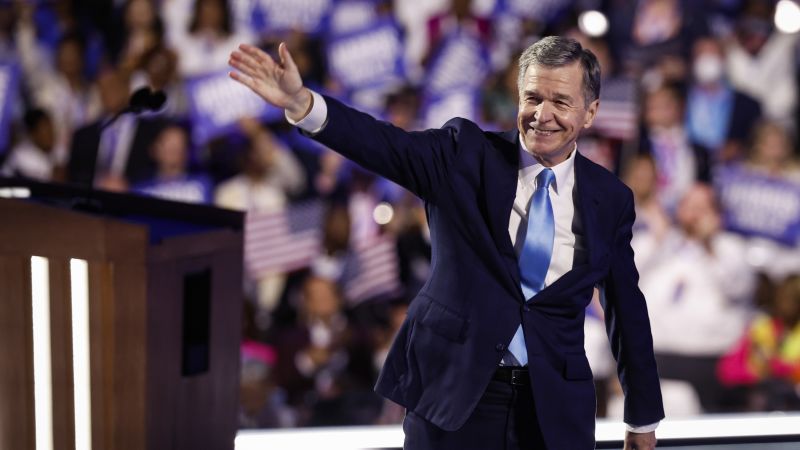Science
Democrats Boost Senate Prospects with Roy Cooper’s Candidacy

Former North Carolina Governor Roy Cooper announced his candidacy for the Senate on Monday, marking a significant recruitment win for the Democratic Party in the lead-up to the 2026 midterm elections. His entry into the race aims to secure the seat currently held by retiring Republican Senator Thom Tillis, heightening Democratic hopes of flipping four Republican-held seats to regain control of the Senate.
As the political landscape evolves, Democrats are actively searching for additional candidates to bolster their chances. The party is particularly focused on states like Maine, Iowa, and Texas, all of which may offer opportunities for competitive races. However, they must also defend key seats in Georgia, Michigan, Minnesota, and New Hampshire, where incumbents are either retiring or seeking re-election.
In New Hampshire, Representative Chris Pappas has emerged as a leading Democratic candidate for the Senate. On the Republican side, former Governor Chris Sununu opted not to run, creating a clearer path for Pappas. In Georgia, popular Republican Governor Brian Kemp also declined to challenge Democratic Senator Jon Ossoff, further benefiting the Democrats. Meanwhile, in Maine, Democrats are rallying around Governor Janet Mills, who may contest long-standing Republican Senator Susan Collins.
Despite these promising developments, internal conflicts and potential primary challenges could complicate Democratic efforts. Senate Minority Leader Chuck Schumer and his campaign chief, Senator Kirsten Gillibrand, expressed confidence in Cooper’s candidacy, stating, “Governor Cooper is a formidable candidate who will flip North Carolina’s Senate seat.” They underscored the notion that the Republican Senate majority is increasingly at risk.
Challenges in Michigan and Texas
Michigan presents a particularly daunting challenge for national Democrats. The open Senate race has raised concerns among party strategists, especially as Republicans consolidate support around former Representative Mike Rogers, who previously lost to now-Representative Elissa Slotkin. Rogers recently gained momentum after Representative Bill Huizenga chose not to enter the race, allowing him to avoid a competitive primary.
Democrats are grappling with a crowded primary featuring well-known candidates such as Representatives Haley Stevens, state Senator Mallory McMorrow, and progressive former gubernatorial candidate Abdul El-Sayed. Many Democratic insiders believe that Stevens, who has the backing of prominent figures including former House Speaker Nancy Pelosi, stands out as the strongest candidate for the general election. A spokesperson for the Democratic Senatorial Campaign Committee remained optimistic, asserting, “Republicans have not won a Senate race in Michigan in 30 years — and 2026 will be no different with failed candidate Mike Rogers on the ballot.”
In Texas, a contentious Republican primary is shaping up between Senator John Cornyn and conservative challenger Ken Paxton. National Republican leaders have expressed concerns about Cornyn’s viability following recent developments, including personal issues surrounding Paxton. Democrats are monitoring the situation closely, believing that a Paxton victory could weaken the Republican position in the general election.
On the Democratic side, former Representative Colin Allred, who lost a Senate bid in 2024, has already launched his campaign. Additionally, Beto O’Rourke, who has previously run for Senate and governor, is exploring another candidacy, engaging actively with voters across the state.
Focus on Ohio and Iowa
The Democratic Party is also keenly interested in opportunities in Ohio and Iowa. In Ohio, defeating Republican Senator Jon Husted hinges on whether former Senator Sherrod Brown, who lost his re-election bid in 2024, will attempt a comeback. Meanwhile, in Iowa, speculation surrounds the future of Republican Senator Joni Ernst, who has hinted at a potential retirement.
Ernst recently stated, “There’s always all kinds of chitter-chatter everywhere, but I have a lot left to do in the United States Senate, so I am not slowing down any time soon. We’ll have an announcement this fall.” Should she choose to step down, the Republican Party has a deep bench, with many believing Representative Ashley Hinson could emerge as the primary favorite.
The Democratic field in Iowa is already expanding, with candidates like state Representative J.D. Scholten, state Senator Zach Wahls, and Knoxville Chamber of Commerce Executive Director Nathan Sage entering the race. Additionally, the Democratic Party is keeping an eye on Alaska, where Republican Senator Dan Sullivan seeks re-election. Former Representative Mary Peltola, who lost her House seat last year, is being considered a potential candidate who could make the race competitive.
As the 2026 elections draw closer, the Democratic Party’s strategies will be closely monitored, with hopes that strong candidates in key races can reshape the future of the Senate.
-

 Lifestyle3 months ago
Lifestyle3 months agoLibraries Challenge Rising E-Book Costs Amid Growing Demand
-

 Sports3 months ago
Sports3 months agoTyreek Hill Responds to Tua Tagovailoa’s Comments on Team Dynamics
-

 Sports3 months ago
Sports3 months agoLiverpool Secures Agreement to Sign Young Striker Will Wright
-

 Lifestyle3 months ago
Lifestyle3 months agoSave Your Split Tomatoes: Expert Tips for Gardeners
-

 Lifestyle3 months ago
Lifestyle3 months agoPrincess Beatrice’s Daughter Athena Joins Siblings at London Parade
-

 World3 months ago
World3 months agoWinter Storms Lash New South Wales with Snow, Flood Risks
-

 Science3 months ago
Science3 months agoTrump Administration Moves to Repeal Key Climate Regulation
-

 Science2 months ago
Science2 months agoSan Francisco Hosts Unique Contest to Identify “Performative Males”
-

 Business3 months ago
Business3 months agoSoFi Technologies Shares Slip 2% Following Insider Stock Sale
-

 Science3 months ago
Science3 months agoNew Tool Reveals Link Between Horse Coat Condition and Parasites
-

 Sports3 months ago
Sports3 months agoElon Musk Sculpture Travels From Utah to Yosemite National Park
-

 Science3 months ago
Science3 months agoNew Study Confirms Humans Transported Stonehenge Bluestones









